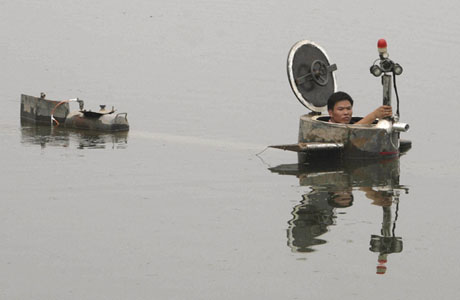Tech
An inventor from the word go
By Lara Farrar and Li Jiabao (China Daily)
Updated: 2010-08-06 15:49
 |
Large Medium Small |
|
 Inventor Tao Xiangli tests his homemade submarine in a lake on the outskirts of Beijing in September last year. Christina Hu / Reuters
|
Beijing - Nearly a year after Tao Xiangli gained international reputation for his homemade submarine, the self-taught inventor still lives in a tiny room in a hutong in Beijing.
But he has a new ambition: Another invention, which is expected to see the light of day by next month.
Outside his room, situated in a narrow lane cluttered with clotheslines, plants and garbage, is where Tao began building the 6-meter subaqueous in 2009 out of old barrels, pipes and other used construction materials he found at various markets around the city.
Once complete, he trucked the submarine to a lake on the outskirts of the capital, put it in the water, and hoped it would work.
It did, actually.
And shortly after, videos of Tao floating around in the apparatus appeared online, as local and international media pounced on the story. Suddenly, Tao had become a national celebrity, joining the list of a number of other wacky Chinese inventors, who spend their lives building everything from flying machines to Mandarin-speaking robots.
The submarine was sold to Expo 2010 Shanghai, and was displayed in a recent exhibition dedicated to China's "peasant inventors".
Tao declined to disclose how much money he earned from the sale. He only said the amount was enough to allow him to focus all his energy on building new contraptions for at least another few months.
He is now working on a robot, which, once completed in September, will be able to dive underwater, climb steps, break into buildings and function as a vehicle.
Tiny parts of the "miracle machine" - screws, gears, batteries and wheels - are strewn about the tiny room he shares with his girlfriend.
A native of a remote village in Anhui province, Tao had a knack for turning objects he dreamed up in his mind into something tangible at an early age, when he remembers never having salt in his meals because it was too expensive.
Since moving to Beijing in 1991, Tao has worked as a construction worker, security guard, fruit seller, waiter, ran a small building supply store until it was demolished and, most recently, was an employee at a karaoke joint.
He quit that job this spring after selling his submarine to the World Expo, under way in Shanghai.
It is difficult for Tao to find answers when asked where he gets his inventive spirit. Partly, he wanted to be different by separating himself from a Chinese education system that emphasizes rote memorization over innovation and individuality.
He says he wanted to display his talent by creating things rather than listing accomplishments on a resume.
Zhu, the landlord who has leased the room to Tao for three years, said the biggest difference between Tao and others was "he did not learn the hollow principles from books, but has his feet on the ground".
He started creating things - toy guns and other objects out of wood and mud - at the age of 11 or 12.
It was in 2005 that Tao began creating contraptions with sophistication greater than the toys he built as a child.
He was working in construction at the time when he started sketching ideas on paper for new machines to help him do his job, then building them, taking them apart again and building something else.
With each new apparatus, Tao took his drawings and building instructions to the government's intellectual property office to register for patents. In a drawer next to his bed, Tao stores around 20 folders containing his "Certificate of Utility Model Patent" documents for his inventions.
Despite everything - the patents, the submarine and its journey to the Expo, the media attention - Tao's future remains unclear.
He says a few factories want to hire him to help build manufacturing machines. He has declined the offers, citing fears that his creativity would be constrained, the working conditions might be poor and that he, ultimately, would be unhappy.
Some even wanted him to invent a substance that could bond sand to glass. He did. From underneath his bed, Tao pulls out a plate of glass with globs of yellow, brown and red sand stuck to it.
"It's not glue," he says, declining to disclose the ingredients of the substance. He hopes the company would buy it from him.
Tao is also looking for investors - someone who has a "long-term view" and appreciates his creativity.
"I want to continue doing things freely and independently," he says. "It's what I like doing."
China Daily